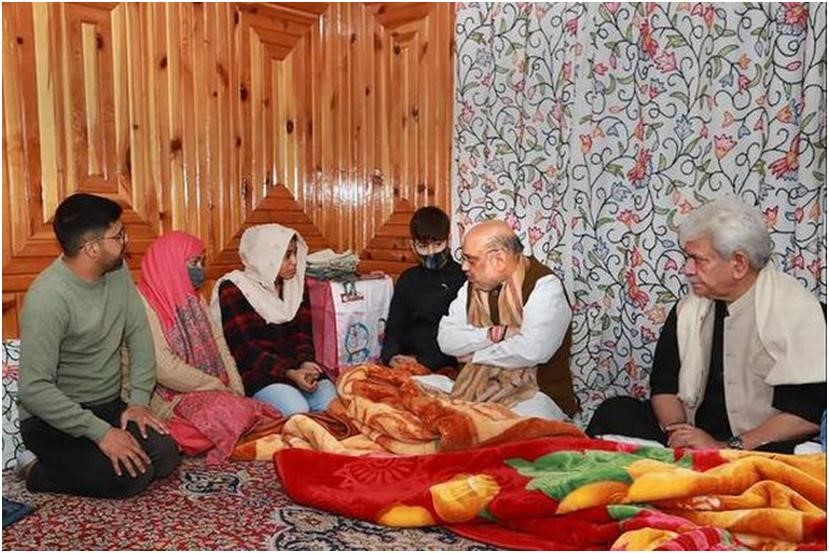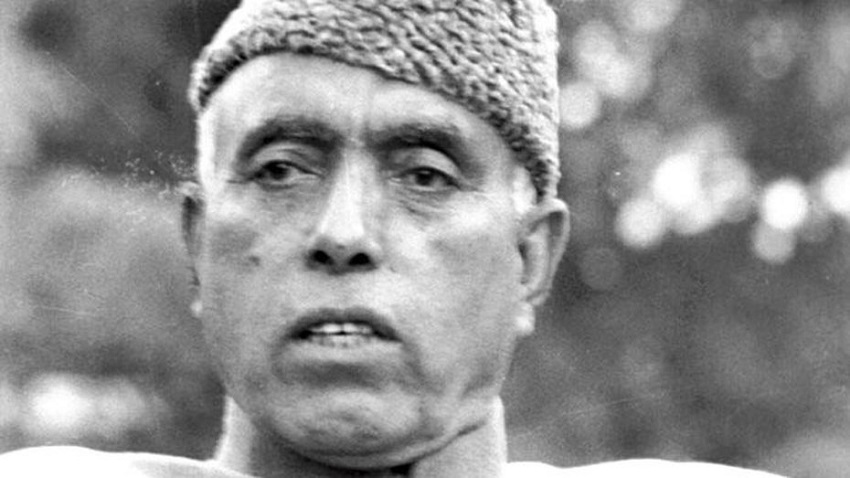
Two years after he had introduced the J&K State Reorganization Bill in the Parliament and got it passed with a majority vote, Home Minister Amit Shah visited Jammu & Kashmir in its new avatar as J&K Union Territory minus Ladakh which has been made a separate entity and conferred Union Status as well.
For the Kashmir Valley leadership, the abrogation of Article 370 has been a surprise and a shock which they usually spoke about but never believed would be translated into action. A constitutional provision designated as “temporary” had almost been construed permanent and then absolutely inviolable. Such was the political and circumstantial adherence to the temporary Act that the local leadership warned that blood would flow if the special status was tampered with or that there wouldn’t be a single person to raise the tricolour in Kashmir if the Article was abrogated.
Nothing of the sort happened. Yes, public men and women suspected of whipping up anti-India passions and giving the episode a communal colour were detained and denied the opportunity to be adept rabble-rousers. Preventive detention in the shape of house arrest is a mild and democratic way of handling obstructionists who believe in misleading the proxies, meaning the public, in what they call expression of freedom of speech. Kashmir could be a fine example of the misuse of democracy and especially the freedom of speech.
The Home Minister has met with several delegations in the valley and Jammu. He has personally heard their grievances. He has interacted with them. He has made an objective assessment of the ground situation.
The trouble in Kashmir is the creation of valley-based leadership. Jinnah’s comment on Sheikh Abdullah was that he was not reliable but in this context, Nehru put all eggs in one basket. He had to remove and arrest the Sheikh on the night of 8-9 August 1953 for he would not want to be part of India even though he concluded an Accord in 1974 after conceding that 12 sal ham ne darbadari ki meaning we wasted 12 years.
With the sudden and almost senseless removal of Bakhshi Ghulam Muhammad from power under the dubious Kamaraj Plan, the then government at New Delhi laid foundation for alienation of Kashmir and its gradual distancing from accession. It was Bakhshi who had piloted the ship through storm after Sheikh Abdullah had reneged. Once the pilot was dropped there was no end to the ship tossing against the waves.

The Kashmir Valley leadership took full advantage of misusing Article 370 and Article 35A. Its plank was that India was trying to snatch the autonomy of sorts given to Kashmir in the Indian Constriction. In retaliation, as the leadership could not disarm the Centre, it turned its ire on the Jammu region as a whole and subjected it to discrimination in various ways. Protests and anger of the Jammu people did not help the Kashmir leadership see the reason. Besides, this leadership targeted the Kashmiri Hindu and Sikh minority also and stonewalled their role in the development of the state by denying them recognition as religious minorities. At the same time, it genially accepted the Centre’s policy of recognizing national religious minorities and Muslims at the top of the list.
In his autobiography, Sheikh Abdullah went to the extent of labelling Kashmiri Pandits as spies of the government of India. Three generations of the Sheikh dynasty ruled over Kashmir; their scions remained the ministers in the Central Cabinet; they enjoyed the freedom of grabbing large chunks of forest land and so did their blued – eyed boys and cronies, one and all in the name of service to the people of Kashmir, and yet not they but the Kashmiri Pandits who toiled to eke out a living were branded as India’s spies.
Valley leadership’s anti-India and anti-Jammu bias deepened while New Delhi continued to pour in huge instalments of money under the nomenclature of developmental projects. State bureaucracy seldom submitted utilization certificates despite repeated reminders and punitive measures by the CAG. The fate of the centrally sponsored developmental projects for J&K is better not to be talked about. In most cases contractors were approved, funds released, a fraction of work done and then the projects were abandoned for one reason or the other.
Projects, viable or non-viable, were almost offered on a platter to the valley whereas the people of Jammu region had to struggle, go on dharnas, bring out protest rallies, faces lathis and run from pillar to post to make New Delhi shell out some small and non-descript projects for the region. Tourism in Jammu is a case in point. In employment, promotion, postings and senior positions in public sector enterprises etc. Jammu region was given a step-motherly treatment.
The Congress regimes never restrained their bias and parochial approach in serving the interests of the people without any discrimination. The rise of Theo-fascism in 1990 led to the ethnic cleansing of Kashmir and the extirpation of the entire Kashmir Pandit community which never figured in the narrative of the Congress.
Denial of state citizenship to lakhs of Hindus and Sikhs who could escape the genocide in Muzaffarabad, Mirpur, Kotli, Poonch and other areas now called POJK in October 1947, when they had found safety in Jammu for more than seventy years is an unjustifiable and blatant violation of the human rights of the affected people according to the UN Charter on Human Rights of Refugees. On the one hand, Sheikh Abdullah went all the way to Lake Success, New York to tell the Security Council how the human and civil rights of Kashmiris were violated by Pakistan-sponsored invaders of the Frontier and on the other he stubbornly denied citizenship of the refugees from the POJK. How could this paradox be resolved, was a headache for the policy planners in New Delhi.
Kashmir Valley terrorists, crossing over to the other side of the LoC were received warmly by the retired Pakistan Army commanders in terrorist camps across POJK and even in such camps inside Pakistan. They were regular infiltrators and exfiltrators engaged in killing, kidnapping and mayhem in the valley. Many among them married in POK/Pakistan, raised families. The J&K government announced amnesty to them if they returned home, promised jobs, documentation and also said all criminal cases would be withdrawn against them and they would be rehabilitated adequately. Scores of them have been allotted accommodation, given jobs and other perks. Compare this munificence with the scurvy treatment meted out to Hindu and Sikh refugees from POK.
In a session of the last legislative assembly of J&K, the chief minister, Mehbooba replying to a question admitted that four to five thousand Rohingya Muslims from Myanmar had come to Jammu and the government provided them with some facilities. She did not go beyond that one sentence. But the reality on the ground is that no fewer than 89 thousand Rohingyas have been allowed to settle down in Jammu by the PDP government. Please note that they were settled along the international border in Samba and Jammu. Within weeks they were provided with Adhaar Card, ration card, identity card, power connection, admission in government schools to their children. How come the defenders of the Special Status for Kashmir allowed 89 thousand Muslims to settle down in the State and particularly in Jammu region? Isn’t it a clear attempt to bring about demographic change in Jammu? And still, Kashmir leadership cries at the top of its voice that the abrogation of Article 370 is intended to bring about change in the demographic complexion in Kashmir not a single outsider has been allowed to settle in Kashmir ever since the NDA government came to power in 2014.
All this narrative explains fully that abrogation of the two constitutional provisions was not only legal but highly desirable to ensure the human rights of the people and to see that violence is curbed and firm steps taken towards strengthening normalcy. Home Minister has categorically stated that the era of discrimination in Jammu is a past story. His emphasis on the development and active involvement of the youth of J&K is what should be given priority.
At the same time, his warning to the terrorists and Theo-fascists is loud and clear. No power on earth can separate Kashmir from India because Kashmiris have opted for accession to India, India has invested trillions of rupees in the all-round development of the erstwhile state and has helped raise per capita income in Kashmir which is around Rs, 9000/- perhaps the highest in the country. Indian army, paramilitaries and state police force have made great sacrifices in preserving the democratic and secular arrangement of the state. Kashmir has very strategic importance for India, and Pakistan is steadily selling out chunks of Indian territories in northern Kashmir to the Chinese to embrace the “iron brother” who may or may not let her breathe one day because of tight embrace.
